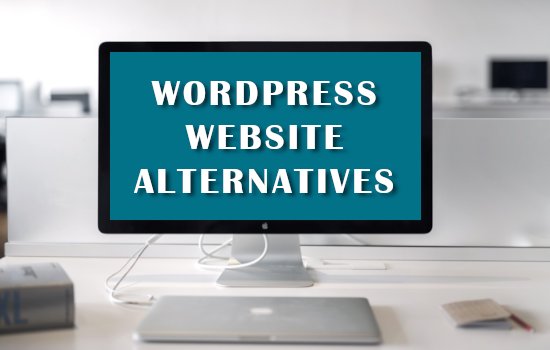 In the world of web development, WordPress reigns as a versatile and widely-used content management system (CMS). However, there are situations where “WordPress website alternatives” become a crucial consideration. While WordPress can be an excellent choice for many, it’s essential to recognize when it might not be the right fit for your specific web project. Let’s explore scenarios where looking beyond WordPress is the key to creating a successful and tailored website solution.
In the world of web development, WordPress reigns as a versatile and widely-used content management system (CMS). However, there are situations where “WordPress website alternatives” become a crucial consideration. While WordPress can be an excellent choice for many, it’s essential to recognize when it might not be the right fit for your specific web project. Let’s explore scenarios where looking beyond WordPress is the key to creating a successful and tailored website solution.
Simplicity vs. Complexity
If your web project’s goal is to create a straightforward, static website with minimal pages and content updates, using WordPress might seem like a bit of an overkill.
Example: You’re a freelance photographer looking to establish an online portfolio to showcase your work. You also provide potential clients with your contact information. In this case, a simple, static HTML website with a few photo galleries and a contact form would suffice. Building this kind of straightforward site with WordPress might be more complex and time-consuming than necessary.
In such cases, building a static HTML website could be a more efficient choice.
Customization Challenges
When your website demands intricate and highly customized features that go beyond the capabilities of readily available WordPress plugins, it’s time to explore alternatives.
Example: You’re developing a web application for a niche industry that requires a highly specialized database structure and unique user management features. While WordPress offers customization options, creating and maintaining such a specialized system may be more efficiently achieved with a custom-built solution tailored precisely to your needs.
Performance Demands
There are websites that place an utmost premium on performance, such as online gaming portals or real-time financial trading platforms. For them WordPress may not provide the lightweight and specialized architecture needed to deliver exceptional speed and responsiveness.
Example: Imagine you’re launching an online multiplayer gaming platform that demands real-time interactions and extremely low latency. WordPress, due to its inherent complexity, might introduce unnecessary overhead. In this scenario, using a more lightweight, performance-optimized framework or platform could be a better choice.
Security and Compliance Mandates
In cases where your website handles sensitive data, such as healthcare records or financial transactions, and must adhere to stringent security and compliance standards, WordPress might not be the most secure choice. A custom-built solution with robust security measures may be the way to go.
Example: Your startup is working on a telemedicine platform where patient data privacy and compliance with healthcare regulations are paramount. In such cases, opting for a CMS like WordPress might pose greater security risks. A custom solution with robust encryption and strict compliance measures would better ensure data safety.
Scalability Requirements
WordPress can handle large websites and substantial traffic. However, if your project involves launching a massive, high-traffic website from the outset, it’s worth exploring more scalable and specialized platforms. Options like headless CMS solutions or custom-built systems can better meet your needs.
For instance, your company launching a new social media platform expecting rapid user growth might benefit from a more scalable architecture, such as a headless CMS or a custom microservices setup.
E-commerce at Scale
WordPress offers e-commerce capabilities through plugins like WooCommerce. For complex e-commerce, dedicated e-commerce platforms work better at handling online retail at scale.
Example: You plan to open an online store with thousands of products, complex inventory management, and international shipping options. While WooCommerce can serve small to medium-sized e-commerce sites effectively, larger and more intricate e-commerce operations might benefit from the advanced features and scalability of dedicated.
Beyond Content Management
If your web project isn’t mainly about content management but focuses on web apps or SaaS, it’s smart to explore tech options beyond WordPress, better suited to your needs.
Example: Your startup is developing a software-as-a-service (SaaS) product that involves user subscriptions, data processing, and complex integrations with other software. In this case, the primary focus is not content management, and a more specialized tech stack for web applications would be better suited to meet your objectives.
Maintenance and Expertise Constraints
It’s important to acknowledge that maintaining a WordPress website involves regular updates, security patches, and plugin management. If your resources or expertise are limited in this regard, choosing WordPress might lead to more complications than solutions.
Example: You’re a small business owner with limited technical expertise and resources. Managing regular updates and security patches for a WordPress site, along with troubleshooting plugin conflicts, could become overwhelming. In such cases, a professional website builder may be a more practical choice.
If your WordPress website needs a maintenance, get in touch with us today. Our expert team at CallSP.in is ready to help you.
Budget Realities
If you have a tight budget and basic website needs, you can find simpler, cheaper solutions outside of WordPress.
Example: A local community organization wants to create a basic website to share information about events and initiatives. With a tight budget, they might opt for a free website builder or low-cost hosting with a simple template to meet their needs without extra WordPress costs.
In conclusion, WordPress unquestionably serves as a powerful tool in the web development arsenal. But, planning a web project wisely means looking at your project’s needs, budget, and long-term goals carefully. While WordPress works well in many cases, there are situations where “WordPress website alternatives” become a necessary consideration.



